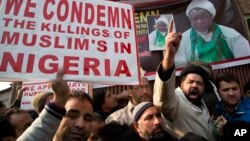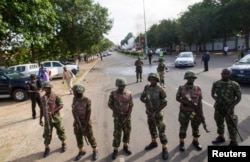An investigative commission set up by the Kaduna state government has found that the Nigerian army used excessive force against a Shi'ite minority sect during a roadside dispute eight months ago.
The commission says 348 civilians were killed, along with one soldier.
International human rights groups have released similar findings.
But the Kaduna state report, released this week, also found fault with the sect, the Islamic Movement of Nigeria, which army spokesman Colonel Sani Usman was quick to point out.
"It's only one recommendation against the Nigerian army, but all subsequent were against the sect," Usman said.
Usman declined to comment on that one recommendation that the government identify the soldiers allegedly responsible for the killings and bring them to justice.
Sect responds
As for the Islamic Movement of Nigeria, the commission says the group has deliberately committed acts of lawlessness and defied the constitution. The report also accuses the group of radicalizing its members.
"They really indicted us,” said Ibrahim Musa, spokesman of the Islamic Movement of Nigeria. “That is what we are disputing. Why should they indict the movement? After all, they haven't heard from the side of the movement? We believe the report is biased against us, also we are aggrieved about it."
The movement declined to participate in the judicial inquiry out of protest. The sect's leader, cleric Ibraheem Zakzaky, has been held without charge since the clash December 12.
What happened that day
The IMN had blocked a major road in the northern city of Zaria to conduct a flag-hoisting ceremony at its headquarters. A military convoy was prevented from moving forward and a heated altercation broke out.
The army claims the Shi'ite group was trying to assassinate an army chief, who was in the convoy — something the movement has denied. The state commission says the movement should have allowed the army to pass.
Instead, soldiers and members the movement reportedly clashed for three days.
The commission says the army recovered one firearm — a homemade pistol — from Zakzaky's home, and that other weapons, such as bows and arrows, were found at unspecified locations.
Movement draws fire
Since the report's release Sunday, some local press have slammed the sect. "The Shia seem to enjoy confrontations with the state," wrote former presidential adviser Reuben Abati in one national paper. Another sought to draw parallels with Boko Haram.
The movement has repeatedly come head-to-head with the Nigerian government. Members say a 2014 incident killed three of Zakzaky's sons.
"It has been a long plan that they have been planning against our leader," said Abubakar Zaky, who joined the movement in 1986. He teaches the Quran to young children. His son-in-law and one-year-old granddaughter were killed in the December skirmish, along with three of his students.
According to the movement, 850 of its members are still missing after the December clash and are presumed dead.
Their spokesman told VOA they may appeal the panel's findings.










